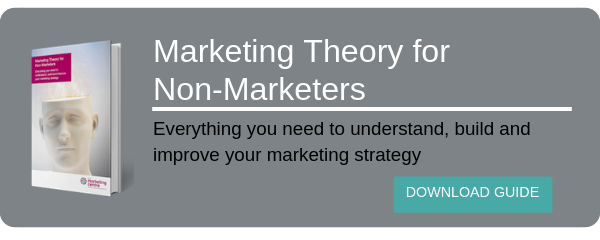You may have heard a thing or seventeen million about the UK’s impending exit from the European Union. For those that haven’t, please pick up a newspaper.
We’re not getting into the good, the bad or the ugly of Brexit here, but it will undoubtedly herald changes, economically, socially and politically. The trouble is, at the moment, there are no definitives. That doesn’t mean you can’t prepare, though - ‘wait and see’ is not a strategy.
With that in mind, here are our 8 marketing tips for getting your business Brexit ready (Bready?). Read on.
1. Stay positive
Press reports, economists, politicians, probably your entire network on social media - there is a hell of a lot of negativity around Brexit. Whether you agree with it or not, a mindset of negativity is something businesses and business leaders can ill afford. You’ve rolled with punches before, and while this might feel like a giant uppercut right now, business leadership is all about making decisions and making plans.
- You may like: Getting Ready for Brexit: Price Perception
Being negative is one of the worst things you can do. Instead, now is the time to be positive about your marketing and seek out opportunities. Be a reassuring presence in your market. Put your customers first, talking to them about what impact Brexit might have on them. Is there a need there that you can meet?
Use your marketing resources to remind your clients of the value you provide them, reinforcing your loyalty to them, and, hopefully, theirs to you. Your competition may try to save money and cut their marketing budget - if so, use that as an opportunity to promote your business more when your competitors are staying quiet.
Want to find and overcome the barriers that are holding your business back? Download our free guide.
2. Make sure your pricing is correct
Don’t be tempted to price in a way that doesn’t maximise sales and margins. In difficult markets, price cutting can look like a way out, but it’s a race to the bottom. In our piece on pricing, we spoke to pricing expert and part-time Marketing Director with The Marketing Centre and author of How to Price Your Platypus, David Abbott. He encourages businesses to put themselves in their customer’s shoes and understand what kind of decision they are making when it comes to price. Compare how frequent their purchase is to how important it is - for example, a business might buy A4 printer paper every month, but servers - which need to back up the businesses’ files and data - once every five years or so.
Tailor your pricing strategy according to the pain points that come with this decision, and take the time to ensure your customers understand what they are getting for their money.
3. Be strategic with your marketing
Although the temptation may be to cast the net as wide as possible, in the hope of catching extra customers, a scattergun approach to marketing won’t produce results but will cost more money. Be more strategic, focussing on who your customer is and what they need from your business. Good marketing needs a strategy.
Set out your goals. When do you want to achieve them by? How are you going to reach them? A marketing strategy is essential to keeping your focus on what’s important, and great marketing will uncover the best opportunities for your business, stop wasted spend, and maximise the return on the money you do invest.
4. Set a budget
Setting budgets is crucial for any marketing plan, but particularly if you predict choppy economic waters ahead. Don’t just estimate numbers, though - the best way to get the most from your investment is to start with your business goals and work backwards.
Planning is everything, so take your strategy from number three (above) and use it as a frame to work out your budget. Formalise how much will be spent on different types of marketing activity within an agreed timeframe. This should include specific business metrics - what you are going to measure and whose responsibility it is to measure it? If you want to stop wasting money on marketing, having a firm handle on your budgets is crucial.
5. Track ROI
Marketing is an investment, not a cost. To make sure you’re getting a healthy return on investment, you need to monitor its efficacy as closely as is possible, paying attention to the metrics that matter.
To learn more about making marketing ROI work for your business, click here.
Without this statistical insight, you may as well be crossing your fingers and hoping. A strategic plan is nothing without reporting, and a great marketing strategy will closely monitor the metrics that matter. Why? Well, to find out what works properly and what doesn’t. Why waste money trying to get to number one on Google, for instance, when third or fourth place may give you a better return?
The metrics you report on will differ depending on your goals. E-commerce is easy to measure; you can directly link your marketing activity to sales through the site. If your aim is brand building, the metrics are a little harder to measure, but website visits, social media reach, social sentiment metrics can all point to success or failure. Whatever the goals, a single view of all your marketing activity and its results is a vital element of your ROI measurement.
6. Don’t take unnecessary risks
Running small-scale tests for marketing campaigns is like dipping a toe in the pool, if the water is too cold or too hot, you don’t want to dive straight in. Testing gives you the opportunity to analyse responses on a micro level before investing everything. It may be tempting to rush to get ahead of the competition, but that gamble rarely pays off.

This ethos doesn’t just stand for marketing campaigns either. For new product development, user group tests are invaluable before you launch to market with a bang. Baby food brand Piccolo told smallbusiness.co.uk that consistently seeking feedback from test groups in their early days allowed them to perfect the product and better understand their target market. The brand has since been selling in Asda for the last two years.
7. Focus on your existing clients
Ambition is not to be sneered at, and your business may be hoping to conquer other markets or hold a bigger share in the long-term. But now is the time to appreciate those who have helped your business grow to where it is today. Showing your existing customer base some love will put you in the best position to weather any coming storm.
As we touched on above, understand their needs and how Brexit is going to impact them. Talk to your customers about their concerns and answer their questions with respect and honesty.
Emphasise your value to your customers and the unique way you can provide them with solutions.
8. Attract and retain the best talent
Great talent is in short supply, so as well as having a good reputation with your external consumers, your HR and marketing teams need to combine forces to make sure you are attractive to the best people. Many companies concentrate on their consumer brand and don’t spend as much time on their brand as an employer. The expertise within your business is invaluable, and to stay ahead, the right employees are paramount.
You may invest hugely in people, you may have won awards for your training and employee benefits, you may have the snazziest office with relaxation areas and in-house masseuses. But if no-one knows about it, this investment will be wasted. Marketing plays a vital role in communicating why your company is a good place to work - how you develop talent and addresses employees’ needs.
Brexit uncertainty is causing understandable concern amongst business owners, but there are some things you can control, and many you can’t. Focus on the former.
Make sure your business fundamentals are solid, and that your marketing efforts are aligned with the overall business goals. Think strategically to reach those goals, and ensure you’re measuring what does and doesn’t work.
Look after your existing customers, look after your talent and attract more where you can, and you will have created a solid foundation for riding out any potential Brexit storm.
To find out how your marketing currently measures up, take 10 minutes out of your busy day to complete our diagnostic questionnaire - Marketing 360. We’ll then provide you with a report that shows you what you’re doing well, and what’s not quite so healthy.




.png?width=800&height=500&name=20%20(1).png)
